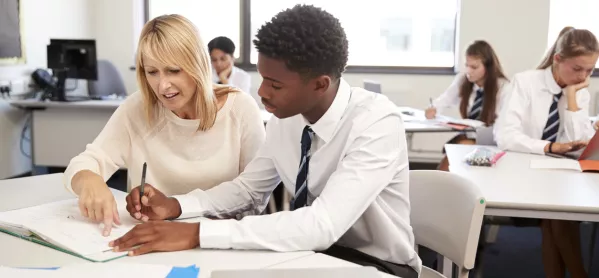Call for parents to help choose Covid catch-up tutors

The government should look at involving parents in the “commissioning” of Covid catch-up tutoring, policy experts have said.
A new report looking at the future of the government’s flagship National Tutoring Programme (NTP), published today, says that Department for Education and Ofsted officials, school leaders and providers all agreed that engaging parents in the process could “help to boost uptake”.
The report, from the Education Policy Institute (EPI) think tank, suggests that the government should explore “how to involve parents in the commissioning of tutoring”, and use feedback from parents and pupils to inform the “promotion” of the next phases of the NTP.
Exclusive: Most Covid catch-up ‘won’t start until 2022’
Covid catch-up: Schools get £579m to employ their own catch-up tutors
School-led tutoring: Everything teachers need to know
It also recommends that further consultation with advocacy and parent groups should be used to inform “more granular targeting” of disadvantaged pupils.
Call for parent input into National Tutoring Programme
Elsewhere, the report warns that providers and sector leaders are concerned that schools might use new government grants, which allow them to hire current staff to run catch-up sessions, to cover the costs of existing teaching assistants - “thereby reducing the programme’s additionality”.
“Some participants expressed concern that a school-led approach means that some schools will choose to spend their grant money on existing staff, which will fuel the challenge to a number of providers that are trying to scale quickly and slow down the national ramping up of tuition capacity,” it states.
The NAHT school leaders’ union told Tes last week that “expecting teaching assistants to tutor suggests that they’re going to have to stop doing something they’re already doing, and substituting one meaningful activity for another is not actually going to shift the dial at all on this”.
The union’s deputy general secretary, Nick Brook, added in response to today’s report: “Instead, government should focus their efforts on mobilising and re-engaging former teachers to join a new tutoring profession, and support them to provide world-class tutoring support to any pupil that is falling behind.”
The EPI’s recommendations for the NTP are based on a review of the existing evidence on its rollout and impact, as well as input from a roundtable of stakeholders - including former programme administrators, DfE and Ofsted representatives, a range of providers, school leaders and unions.
The think tank found that stakeholders agreed that involving parents in the commissioning of tuition could be “useful” and help “boost uptake”.
“Roundtable participants reported that feedback from parents and carers, particularly those unable to afford private tuition previously, has been highly positive,” the report says.
“Research is clear that parental involvement contributes to the success of interventions to raise attainment, and participants were in agreement that engaging parents in commissioning tuition could be useful and help to boost uptake.”
The EPI recommends that:
- There should be further consultation with advocacy and parent groups around the appropriateness of the current model for disadvantaged groups of pupils and to inform more granular targeting.
- The government should explore how to involve parents in the commissioning of tutoring, as well as using feedback from parents and pupils to inform the promotion and rollout of the programme in the next phases.
Ahead of the forthcoming government spending review, the think tank has also reiterated its calls for a three-year funding package of £13.5 billion in England to mitigate the effects of the Covid pandemic on pupils’ learning.
So far the government has allocated £3.1 billion for education recovery.
Julie McCulloch, director of policy at the Association of School and College Leaders, said the report’s findings served as “a clarion call to the government that a substantial education recovery fund is required at next week’s spending review”.
A government spokesperson said: “We have committed to an ambitious, long-term education recovery plan which will deliver world-class training for thousands of teachers and high-quality tutoring for millions of pupils.
“We are significantly expanding the National Tutoring Programme this year, building on the progress from last year when more than 300,000 children benefited, and giving schools more flexibility to deliver tutoring that works for them and their families.
“This investment in education recovery - of over £3 billion to date - comes on top of the £14.4 billion this government is investing in schools in total over the three years up to 2022-23, helping young people leave school better educated, better skilled and ready for the world of work.”
You need a Tes subscription to read this article
Subscribe now to read this article and get other subscriber-only content:
- Unlimited access to all Tes magazine content
- Exclusive subscriber-only stories
- Award-winning email newsletters
Already a subscriber? Log in
You need a subscription to read this article
Subscribe now to read this article and get other subscriber-only content, including:
- Unlimited access to all Tes magazine content
- Exclusive subscriber-only stories
- Award-winning email newsletters
topics in this article



